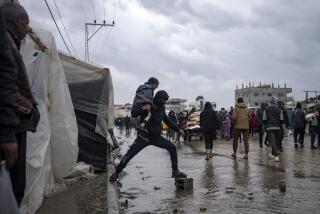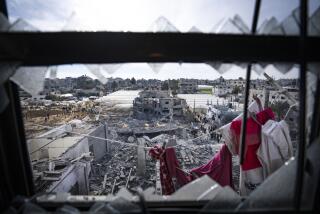Afghans Abandon Taliban Stronghold
- Share via
CHAMAN BORDER CROSSING, Pakistan — Frightened by the heaviest U.S. bombings so far in Kandahar, scores of Afghans arrived at this border station Thursday to seek refuge in Pakistan, carrying rumors of destroyed houses and dead civilians along with their meager belongings.
Although the stories of casualties were widespread, no one interviewed had firsthand knowledge of anyone who was killed. What seemed certain, however, is that nearly five days of U.S.-led bombings have unnerved the population of the Taliban’s spiritual capital and left the city’s defenders frustrated.
“In Kandahar, there is chaos, and everyone is looking out for himself,” said Wakil Khan, 25, as he strode across the frontier with relief.
Although Pakistani officials have not declared the border open, a steady flow of Afghans crossed over during a visit by a group of journalists Thursday afternoon. They were riding motorbikes, crowding onto the backs of trucks, driving donkey carts and trundling on foot. Some carried their belongings in battered suitcases, cloth sacks or plastic baskets.
It was hard to get a fix on the exact number of arrivals. A guard at the post estimated that about 300 Afghan families a day had been admitted here since the bombing campaign started Sunday and that the flow had increased Thursday after a night of heavy attacks on Kandahar, 60 miles northwest of Chaman.
But a spokesman with the Office of the U.N. High Commissioner for Refugees, Rupert Colville, said his agency estimated that about 50 refugees a day were arriving at the post. He had no information about Thursday’s movements. The agency has complained that red tape and security concerns in Pakistan have been blocking it from sending its field teams to the border.
The Afghans are supposed to have visas or Pakistani identity cards to enter the country, although some have said they paid bribes to cross. Amid the dusty haze on the other side of the border, a crowd milled about, evidently waiting to cross.
“I left my place because of the fear and scare over there,” said Amin Mohammed, 17, an arrival from Kandahar. “Yesterday I saw two bombs falling. . . . They are killing innocent people.”
Khan, the 25-year-old from Kandahar, was nearly white with a coating of dust from his journey to the border. He said he had heard that as many as 200 people were injured by the overnight raids.
Living conditions in the city had not changed much because of the bombings, he said. “The food and water is as bad as ever.”
“The Taliban are fighting, but they are helpless and frustrated,” said Ahmad Rasul, a man in his 20s, walking into Pakistan with two women wearing burkas, a traditional garment mandated by the Taliban regime.
“Oh, there were lots of bombings last night. The bombs were raining,” he said. “I could hear the sounds of the plane and the sounds of the bombing, all coming together.”
An Afghan businessman in his 30s, who did not wish to give his name, said that until the attacks early Thursday, the U.S. forces had been hitting only the airport and “official buildings.” But on Thursday, he said, he had heard that about 25 civilians had been killed.
The businessman scoffed at the U.S. program to drop food packages during the strikes. “We don’t need food, and we don’t need bombs,” he said, gesturing toward his children. “For the last four nights, we did not sleep. . . . They were weeping. That is when we decided to leave.”
The Afghan Islamic Press, a Pakistani-based news agency, claimed Thursday that U.S. raids had killed more than 140 civilians in the preceding 24 hours, including dozens in one strike on a village near Jalalabad. At a news briefing in Islamabad, Pakistan’s capital, Taliban Ambassador Abdul Salam Zaeef said up to 100 civilians had been killed.
But so far, the Taliban has not backed up its claims of large casualties by allowing journalists access to victims or by broadcasting footage of significant damage or carnage.
In Quetta, in southwestern Pakistan, an Afghan opposition member said his group is convinced that so far the strikes have been hitting only military or Taliban facilities.
“We are satisfied that they have not committed civilian casualties in large numbers. God forbid that that happens,” said Abdul Malik, who is working on behalf of a plan for his former monarch, Mohammed Zaher Shah, to convene a traditional council to form a new Afghan government.
In Pakistan’s North-West Frontier Province, authorities bracing for a possible flood of refugees and casualties seemed thrown off balance by the absence of activity. Four and a half days into the air campaign, only a few new Afghan refugees have trickled through the nearby Khyber Pass into Pakistan.
At the Hayatabad hospital in Peshawar, the medical facility in Pakistan nearest to Kabul and Jalalabad, staffers readied 200 beds for casualties and remain on 24-hour alert, but so far they have received only one patient.
“There is so much [military activity] happening, yet we have so much less than we expected,” said the hospital’s deputy administrator, Abdul Rahim. “We can only hope it stays this way.”
Jalalabad was among the initial major targets of the American raids, but during the past two days, Kandahar and Kabul, the capital, have experienced far heavier attacks.
Rahim said the hospital’s lone war casualty--a 35-year-old Afghan farmer seriously wounded by shrapnel Sunday night--arrived Monday afternoon in critical condition after an 80-mile journey on a bus from Jalalabad. Rahim identified him as Mohammed Raza, who has two wives and seven children.
According to the victim’s brother-in-law, Raza was treated initially at a clinic in Jalalabad but transferred to Peshawar because of the seriousness of his wounds. Raza’s village neighbors pooled together the $10 bus fare needed to get him to Pakistan.
*
Daniszewski reported from the Chaman border crossing and Marshall from Peshawar.
More to Read
Sign up for Essential California
The most important California stories and recommendations in your inbox every morning.
You may occasionally receive promotional content from the Los Angeles Times.













